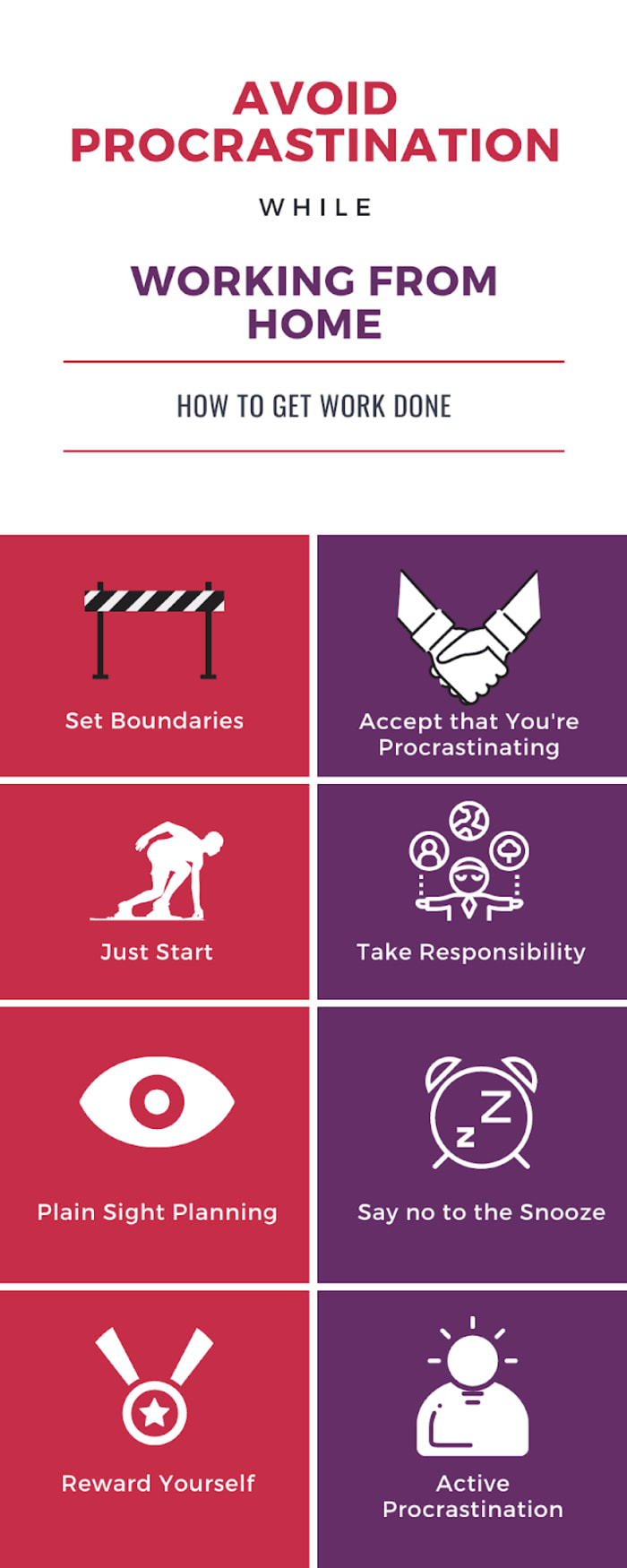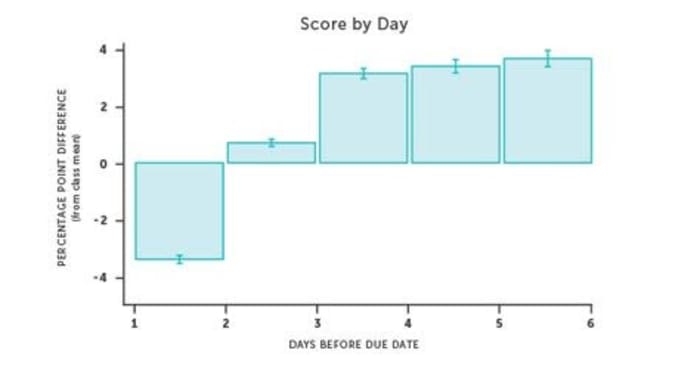When you work from home, procrastination can become your worst enemy. There are so many other things to do around the house! It could be your kids, your pets, or any other chore that you’ve been putting off for a while.
Using the same space for both work and relaxation can be tough. You can either find yourself working all the time or wanting to wind down continuously. So it would be best if you learned to set some boundaries for yourself.
Unchecked cleaning list might not be your only reason for procrastinating. It could be the fact that you’re feeling overwhelmed. Or perhaps you fear failure. Other common causes include lacking motivation or simply being overworked.
Before taking action against procrastination, you should find the reason behind it. If you put too much pressure on yourself, you’ll find yourself back where you started.

So How Do You Get Work Done?
1. Set Boundaries

The worst thing you can do is have all your activities in one place. Distractions will surround you. It gives you too many options for activities that aren’t in any way related to the work you need to do.
To avoid this unnecessary challenge, you should try to set up a home office. This would be a place where you can do your work uninterrupted. But, more importantly, you will be able to disconnect when you leave that place–you won’t have to think about work all the time.
2. Accept that You’re Procrastinating

Studies show that procrastinators usually feel guilt, shame, or anxiety because they choose to do things unrelated to their tasks. This means that the more you procrastinate, the worse you will feel. And that will make you procrastinate more. It’s a vicious cycle.
So, to break that cycle, start by accepting your current situation. Yes, you’re procrastinating. Let’s see what you can do to change that. Get yourself in a positive state of mind and focus on what you can improve.
3. Just Start

Yes, we know, easier said than done. However, there are different approaches you can explore. Try to find what works for you and start there. Don’t try something just because other people say so.
For example, some people choose to “eat the frog.” That means starting with the most difficult tasks to get them out of the way. Other people begin with the easiest tasks to get their workflow going. Whichever type of person you are, the hardest part is just getting started in the first place.
4. Take Responsibility

Source: Penn State University. A study about how students work when deadlines are approaching.
You should set clear deadlines for all the tasks that you have to do. Or tell other people what you’re doing and when you’re planning to finish. This will make you feel time-bound and will help you finish your work on time.
However, there’s research that shows how self-imposed deadlines are less effective than externally set deadlines. So, if it is possible, try to get your deadlines from other people. The sense of extra authority behind the deadline will be a greater motivator.
5. Plain Sight

Yes, the famous to-do lists. We’re sure you’ve tried them before. But they are most effective when you can look at them all the time. If you just write your tasks on the agenda and forget about them 2 minutes later, it’s useless.
Another thing that you can try is task prioritization. Knowing which tasks are more important than others is a great improvement for time management. There are many tools you can use to make this process easier.
For example, there’s Eisenhower’s Urgent/Important Principle. There are 2 main categories for tasks, as the name implies. Activities in the important category yield an outcome that will lead to you achieving your goal. Urgent activities are the tasks that need immediate attention but are usually for someone else’s goal.
6. Say no to the Snooze

When working from home, you might be tempted to think you can catch up on much-needed sleep. However, even if your schedule is more flexible, you still need some structure to get work done.
This means that you should still wake up early and take responsibility for your work. Waking up regularly will help you be more organized and have better time management skills overall.
7. Reward Yourself

While they shouldn’t become the purpose you work for, rewards can be really motivational. If you’ve just finished a difficult task or are significantly ahead of schedule, give yourself a little prize.
These rewards don’t need to be substantial. They could be your favorite coffee, dessert, or 5 extra minutes on your break. Their purpose is to keep your spirits up. However, you should be honest with yourself and award these prizes when you actually deserve them.
8. Active Procrastination

Source: Penn State University. A study about how students work when deadlines are approaching.
Research shows that some people actually use procrastination to be productive.
What?
Well, the pressure of upcoming deadlines can act as a great motivator. By putting off work until the final dates come up, they do the same work but in less time. However, if you’re thinking of trying this, there are a few things to consider.
First, the level of stress. Are you a person that thrives under stress? Then this might appeal to you. Second, the quality required for your work. Can you meet the standards in a short amount of time? If yes, you can try this method for yourself and see what happens.
What to Keep in Mind
Working in an office and from home are two totally different things. At home, you’re basically working in the land of distractions. Therefore, it’s so much easier to procrastinate—there are so many other things you could be doing instead of work.
However, you should know that you don’t procrastinate just because your cat wants to play with you. Bigger things could be at play here. Perhaps you’re feeling overworked, or you fear failure. Maybe you are overwhelmed with a project or simply lack motivation.
Whatever the reason behind your procrastination, you need to identify it and solve it before trying to make things better.
The first thing you need to do is to accept your situation. Afterward, you need to take into consideration that people have different work styles. Therefore, something that worked for someone else doesn’t necessarily work for you too.
To improve your time management, you need to try more solutions and see what fits your style. The important thing here is not to put pressure on yourself—or you will be back to where you started–avoiding tasks.
Further Reading:
20 Remote Startups to Follow in 2020 and Beyond
How to do high-quality virtual meetings? A step by step guide.




